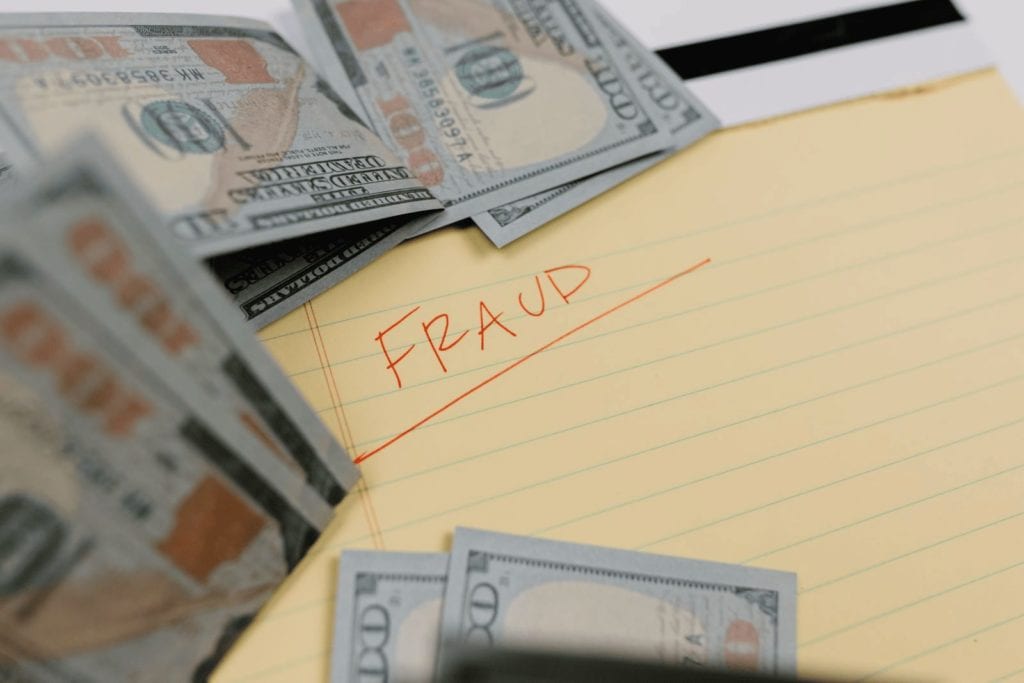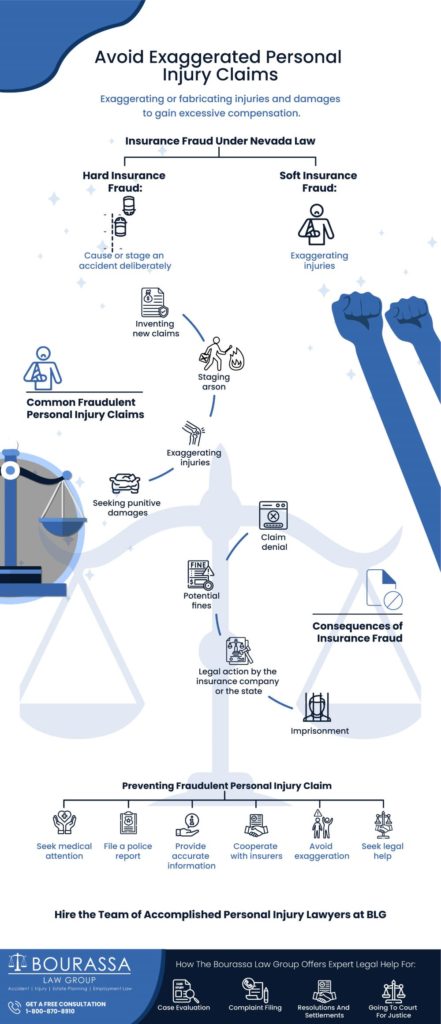
When an accident leads to injuries, filing a personal injury claim can be a crucial step for those seeking compensation. But it’s important to understand that not all claims are treated the same, especially in Nevada, where strict laws are enforced to deter fraudulent claims.
In this article, we’ll explore various aspects of personal injury claims, insurance companies, and fraudulent activities in the context of insurance fraud and car accidents.
What Are Exaggerated Personal Injury Claims?
An exaggerated personal injury claim is precisely what it sounds like; a claimant inflates or fabricates injuries and damages to obtain higher compensation than they are entitled to. Such claims often aim to deceive an insurance company or the legal system.

Nevada’s Laws and Insurance Fraud
Nevada law defines two types of insurance fraud: hard and soft insurance fraud.
Hard Insurance Fraud:
Hard fraud occurs when individuals intentionally cause an accident scene, stage accidents, or exaggerate injuries. It’s a deliberate action to deceive insurers and claim more than they are entitled to. Those caught filing inflated claims and engaging in hard insurance fraud may face not only criminal charges but also jail time, not to mention the potential for felony convictions.
Soft Insurance Fraud:
While soft insurance fraud doesn’t involve intentional accidents, it still encompasses deceptive behavior. Claimants in soft fraud cases typically exaggerate their injuries, claim losses that are not backed by substantial evidence, or seek money for property damage that wasn’t related to the accident. Though not as severe as hard insurance fraud, the consequences can be equally troublesome, leading to fines and potentially imprisonment.
What Are the Examples of Fraudulent Personal Injury Claims?
A fraudulent personal injury claim can manifest in various deceptive forms, putting the claimant’s integrity and legal standing at risk. Inventing new claims, staging arson, exaggerating injuries, and seeking punitive damages are common examples. Let’s discuss each:
Claimant Invents New Claim:
This audacious tactic involves the creation of an entirely false claim. Some individuals might craft elaborate stories of accidents that never happened, embellishing them with false details in an attempt to secure financial compensation. These fabricated tales can encompass a wide range of scenarios, from staged slip-and-fall accidents in grocery stores to fictional car crashes in remote areas.
Staging Arson Claims:
In cases of property damage, some claimants may go to extreme lengths, even resorting to staging arson incidents. By deliberately setting fire to their property and then filing a claim for insurance money, these individuals not only jeopardize their own freedom but also put the lives of others at risk. The consequences of such actions extend far beyond legal penalties, with the potential for lifelong guilt and remorse.
Exaggerating Injuries:
Among the most prevalent forms of personal injury claim exaggeration, this tactic involves magnifying the extent of physical injuries sustained. Claimants might embellish the severity of their injuries, misrepresent the duration of pain and suffering, or attribute unrelated health issues to the accident. Such exaggerations are often driven by the desire for a larger settlement, which can lead to legal ramifications when exposed.
Seeking Punitive Damages:
Some individuals, driven by the prospect of financial gain, resort to intentionally causing accidents and injuries to qualify for punitive damages. Unlike compensatory damages, which aim to cover actual losses, punitive damages are meant to punish the wrongdoer for their deliberate misconduct. Attempting to qualify for punitive damages through fraudulent means is not only ethically questionable but also a potential ticket to legal trouble.
The Role of the Court and Legal Duty
When a fraudulent injury claim reaches the courtroom in Nevada, the legal system assumes a pivotal role in ensuring justice prevails. It’s within this setting that the veracity of the claim is scrutinized, evidence is weighed, and the principles of justice are upheld.
Determining Validity in Court
In the courtroom, the primary objective is to determine the validity of the personal injury claim. This process is a meticulous one, with judges, attorneys, and legal experts working in concert to assess the evidence provided by both the claimant and the insurance company. Their collective aim is to separate fact from fiction and ensure that justice prevails.
Weighing the Evidence
In the pursuit of justice, judges play a crucial role in weighing the presented evidence. They’re tasked with a critical responsibility: to examine the case objectively. Judges meticulously review all documents, testimonies, and physical evidence to ascertain the legitimacy of the claim. This process requires a discerning eye, as it necessitates the identification of discrepancies, inconsistencies, and any signs of deliberate deception.
Spotting Discrepancies and Inconsistencies
One of the key responsibilities of the court is to identify discrepancies and inconsistencies in the presented evidence. This often involves comparing various pieces of information, such as medical records, witness statements, and expert opinions. Any inconsistencies or contradictions may raise red flags, prompting a closer examination of the claimant’s credibility. The court, in its pursuit of justice, is acutely aware that such disparities can indicate exaggeration, fraud, or deception.
Nevada’s Legal Duty for Claimants
Nevada law places a profound legal duty on claimants who file an injury claim. This duty is straightforward but of paramount importance: claimants must provide honest and accurate information when submitting their claims. They are expected to provide full and accurate accounts of the events, injuries, and actual damages to get the accident covered.
Any deviation from the truth, particularly when it’s made with the intent to deceive, is met with severe penalties.
Consequences of Violating the Legal Duty
Violating the legal duty to be honest and accurate in a personal injury claim can have serious ramifications in Nevada. The legal system has established a framework of consequences to deter fraudulent activities. These penalties may include, but are not limited to:
Denial of the claim, leaving the claimant without the compensation they sought.
Potential fines, imposed as a punitive measure against fraudulent claimants.
Legal action by the insurance company or the state, which can result in both civil and criminal penalties.
The potential for imprisonment, which varies in severity depending on the nature of the deception.
In Nevada, legal authorities take the duty of honesty in fraudulent injury claims seriously, viewing it as an essential aspect of maintaining the integrity of the legal system and the trust between individuals and insurance companies.
Preventing Fraudulent Personal Injury Claim
To prevent fraudulent insurance claims and potential legal troubles, it’s crucial for all parties involved to act honestly and ethically. If you’ve been in an accident, follow these guidelines to ensure that your claim remains legitimate:
Seek medical attention promptly and consult with multiple doctors if necessary.
Report the accident to the police and obtain a police report.
Provide honest and accurate information when filing an insurance claim.
Cooperate with insurers, investigators, and legal authorities to the best of your ability.
Avoid exaggerating injuries, damages, or any aspect of the claim.
Seek legal help, if necessary.
By following these simple steps, you can avoid falling into the trap of a fraudulent claim, ensuring that your case remains legitimate and valid under the law.

Hire the Team of Accomplished Personal Injury Lawyers at The Bourassa Law Group
Fraudulent personal injury claims are a serious issue, and Nevada law takes a stern stance against those who engage in fraudulent activities. Whether it’s hard insurance fraud, where individuals stage accidents, or soft insurance fraud, where they exaggerate injuries or losses, the consequences can be severe. Insurance companies and the legal system work diligently to ensure that a fraudulent claim is exposed and penalized.
In the end, it’s essential to remember that honesty and integrity should be at the core of any personal injury insurance claim. By acting ethically and providing accurate information, you can avoid the serious legal and financial consequences associated with exaggerated claims. And remember, the legal system is here to protect the rights of everyone involved, ensuring that justice is served, and the truth prevails.
Need to file a legitimate personal injury claim? Hire the qualified attorneys at BLG. We are devoted to seeking justice for you and guiding you throughout the process.
Discuss your case with us by booking a free consultation appointment today!





